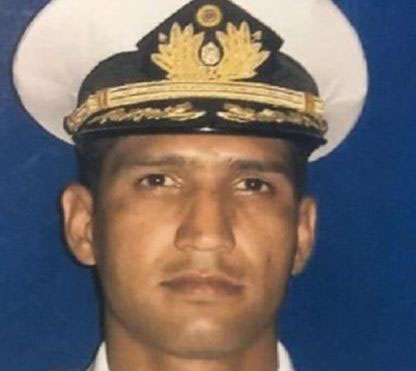CARACAS, (Reuters) – Venezuela has charged two intelligence officials with homicide over the death of a navy captain who had been in military custody, the country’s chief prosecutor said yesterday, following outrage over alleged torture of the deceased officer.
President Nicolas Maduro’s government over the weekend confirmed the death on June 29 of Rafael Acosta, arrested eight days earlier for alleged participation in a coup plot, without providing details on the cause of death.
Acosta’s wife and rights groups accuse Maduro’s government of torturing Acosta to death and refusing to clarify the circumstances. United Nations human rights chief Michelle Bachelet yesterday said she was “shocked” by the torture allegations.
Chief Prosecutor Tarek Saab said two officials working for military intelligence agency DGCIM had been charged with homicide in Acosta’s death, without making reference to torture or explaining how Acosta was killed.
“Two officials working for the (DGCIM) have been linked to this regrettable incident,” Saab wrote on Twitter. The two officials are a sergeant and a captain of the National Guard, who were aiding the DGCIM, he said.
Both Bachelet and a lawyer for Acosta’s family have said that charging individuals with homicide was not sufficient and that high-level officials should be held to account.
“This is not enough,” said Alonso Medina, a lawyer representing Acosta’s family, in a telephone interview earlier yesterday, adding that the case implicates the armed forces as an institution in the use of torture.
Critics accuse Maduro’s administration of arbitrary detentions and the systematic use of torture against dissidents and military officers accused of conspiring against his government.
Acosta’s wife, Waleswka Perez, earlier yesterday demanded that the government hand over Acosta’s body so it could be inspected. Bachelet urged Venezuelan authorities to conduct a transparent investigation into his death.
“I am shocked by the alleged torture of Captain Acosta Arevalo, and that his treatment in custody may have been the cause of his death,” Bachelet said in a statement released by her office.
Venezuela’s information ministry did not respond to a request for comment.
Maduro has said the country fully prosecutes human rights abuses and that Venezuela is unfairly targeted for criticism because of its socialist politics.
Diosdado Cabello, head of the pro-government Constituent Assembly, referred questions about Acosta’s case to the executive branch.
Bachelet visited Venezuela in June to speak with Maduro and opposition leader Juan Guaido about human rights violations committed by authorities and had said two U.N. rights experts would remain in the country to follow up on related issues.
The United States and the Lima Group of Latin American nations have also condemned the Maduro government over the incident.
Acosta, 50, was detained on June 21. When he was taken to a military tribunal on June 28, he was in a wheelchair and was barely able to speak after having been beaten so severely, Perez said over the weekend in televised interviews from Colombia.
The judge sent him to a military hospital, where he died in the early hours of June 29. Despite numerous requests, neither his family nor his lawyer have been given access to his body, Bachelet said.
A defense ministry statement on Sunday said Acosta fainted at the start of the tribunal hearing and was transferred to a military hospital, without offering any further details.









